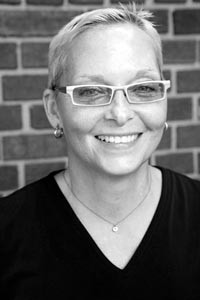"Why is the raw body so unloved / When it's out-loud?" asks Jan Beatty in "Skinning It," a poem in Red Sugar, her new collection on University of Pittsburgh Press. Beatty, 56, has been a local poetry mainstay since the early 1990s. The Pittsburgh native directs Carlow University's creative-writing program, teaches there at the graduate level and runs Carlow's Madwomen in the Attic poetry workshop. She also co-hosts and produces "Prosody," WYEP's long-running weekly show for poets and writers. Beatty's books Mad River (1995) and Boneshaker (2002) were acclaimed for their raw and fearless takes on growing up, sex, violence, rock 'n' roll and the struggles of everyday life. She spoke with City Paper at Regent Square's Katerbean, her neighborhood coffee shop.
How is Red Sugar different than Boneshaker?
This one kind of goes deeper in getting to the inside of the body. "Red sugar" is blood. I'm thinking of the woman narrator of the book as a sort of recorder and carrier of deeds and dreams, and blood is the code that sort of defines who we are.
There was a searching in Mad River and Boneshaker, but now it's more like a deciding [laughs]. It's like, "This is this" -- sort of the body creating its own legacy, and what kind of humanity happens in the midst of transformative struggle. It's not like, "Oh, the moral of this story is ..." because I hate that crap. It's more like, what are the stories inside us that drive us, that we're not aware of?
And there's a lot of sexuality and violence, which were in my other books, but I feel like I'm having a tug of war between the romantic and the brutal. 'Cause I sort of hate books that go one way or the other.
What interests you about brutality?
I feel like there's too much shying away from brutality, even though it's everywhere. It's in the culture. It's on HBO, it's in football, it's in Pittsburgh. I think it's deep in Pittsburgh. I feel like, 'Why are we denying that it's in us?" Especially women are just taught to be so nice and sweet; c'mon, let's get real. We have these urges, we have these parts.
"Why is the raw body so unloved / when it's out-loud?"
I sort of hate that we all walk around with these bodies and we all have these things that we do with them, and yet when you talk about it, sometimes people don't want you to talk about it. It seems like there's a hatred of the body, and a hatred of raw sexuality. If I use certain words -- a lot of it goes back to language -- people just get so bent out of shape about it.
It's all around us -- cable TV, billboards.
Why don't we just commandeer it? Why don't we move into it and enjoy it and take it over and say, "Here's what I think about it?" And then we can interact with it, instead of just being attacked by these images.
In "I Saw One of Blake's Angels," your narrator visits a Downtown peep show.
As a much younger woman, I was a young rabid feminist, and I thought, "I'm gonna interview a sex worker!" And I get down there, and everything changes. I thought, "Nahh, I'm not gonna do that interview." There was a lot of energy and a lot of wild things happening, and I was really interested in the woman. I thought, "I really like her." [Writing the poem,] I realized there was some desire happening between [the narrator and the stripper], and I was thinking, "How would they talk to each other?"
I want the speaker of poems to be indicted most of the time. I hate this idea of the separate observer who's not involved. I want interaction, I want communication. I want them to ram into each other. I want something to happen.
In "To the Well-Meaning," you write, "forget the buddhist transcendance thing."
I was in this phase when I got tired of everybody talking about Buddhism, and I was like, "OK, enough about that already." I get really irritated when people don't want to have to fight. Sometimes that's the only way to get to know people. But if we're transcending, if we're on our little yoga mats -- I mean, I like racket sports. I was a phys-ed major in college for a while.
Really.
Yeah. I was designated hitter on the softball team. I like to whack things. Maybe I'm unevolved. ... I love football. I love the Steelers. A lot of poets hate me for it.
I found out not too many years ago that my birth father was a Canadian hockey player. And he was famous for cross-checking people, and he was kind of well known back in the '50s. ["Wild Bill" Ezinicki, later a pro golfer, played in the National Hockey League and for Pittsburgh Hornets.] I met him, and I thought, "That's probably where I get all this viciousness." I sort of like that genetic [link] -- that goes back to the blood thing.
Jan Beatty reads from Red Sugar, with book party 8 p.m. Fri., April 18 (doors at 7 p.m.). WYEP Community Broadcast Center, 67 Bedford Square, South Side. 412-381-9126
Skeet Shooting Out West
By Jan Beatty
Tired of the old questions, whose blood, whose cock,
she goes out among red-tailed hawk for shooting lessons.
Cowboy Doug says: Here's your shell, inside
you've got the shot, gunpowder and this here's called a wad.
Shooting her wad from the 20-gauge Winchester,
she imagines her real father (whoever he is) shooting his/
making her. This makes her want a pump-action shot-
gun, something she can relate to. She dearly loves the smell of
gunpowder, is this genetic? Maybe her father was
A cowboy, she's loving the gunmetal/kick in the shoulder/
: lip on the V of her hand aroused, someone's blood
under her skin.















